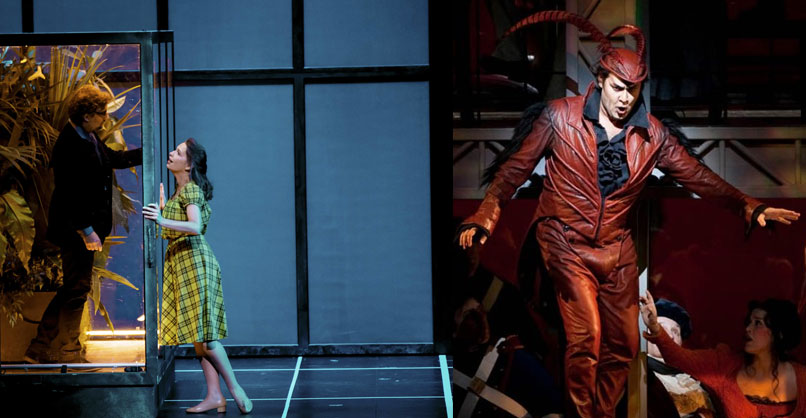
La Damnation de Faust
Listen to the Music & Opera playlist :
La Damnation de Faust by the French composer Hector Berlioz was first performed in 1846 in Paris. He described it as a dramatic legend in four parts.
Unusually for an opera, La Damnation de Faust also contains a children's chorus. Based on Goethe's dramatic poem, Faust, the opera is always considered a challenge to stage. Even Berlioz himself conceded that the stage techniques of his age were not able to do it justice and that it would come into its own in the future. It is, however, more often staged as a concert performance. At its first premiere La Damnation de Faust was not well received either by the public or by critics; Berlioz suffered a huge financial loss. Today the opera is performed regularly in concert halls with the occasional operatic production.
HISTORY
In this tragic opera feelings of the worthlessness of life are explored. Faust feels there must be something better for him and thinks he has found this with his love for a younger woman, Marguerite. His actions, however, leave her ill and at death's door. In exchange for her redemption, Faust sells his soul to Mephistopheles, or the devil, not realising the implications.
Act 1
Faust, an aging scholar, contemplates the renewal of nature. He knows he will never experience real happiness as he is not a simple peasant singing and dancing in the country. As an army marches past in the background he tries to understand why soldiers are so enthusiastic about battles and glory.
Act 2
Faust is tired and depressed and returns to his study planning to take his life when the church bells and an Easter hymn remind him of the religious faith he had as a youngster. Mephistopheles suddenly appears in the room and offers to take Faust on a journey to recapture this youth and faith and to fulfil all of his wishes. Faust sets off with him. They travel to a tavern in Leipzig where they listen to a student, Brander, singing a song about a kitchen rat who lives the high life until he is poisoned. Mephistopheles then entertains the audience with a song about a flea bringing his entire clan to infest a royal court. Faust thinks it is all very vulgar and demands to be taken elsewhere. Mephistopheles takes him to a beautiful meadow by the Elbe where Faust falls in love with a maiden, Marguerite. The pair enter her town along with a group of students and soldiers.
Act 3
Faust and Mephistopheles hide in Marguerite's room. Faust believes she is pure and innocent and will be the answer to his prayers but Mephistopheles predicts her loss of innocence. Faust and Marguerite talk and say that they have been dreaming of each other and declare their love. Mephistopheles arrives suddenly and announces that the neighbours know there is a man in her room and her reputation is lost; her mother has been summoned! Faust and Mephistopheles disappear.
Act 4
Faust seduces and then abandons Marguerite who waits forlornly for his return. She hears soldiers and students approaching in the distance but Faust is not amongst them. Then tragedy strikes, Marguerite gives her mother too much sleeping potion and accidentally kills her. She has been taken to prison and will hang the next day.
In a panic Faust agrees to Mephistopheles offer to save her in return for Faust's soul. Faust, of course, agrees and the pair ride off on black horses. Faust thinks they are going to fetch Marguerite but panics when he sees demonic visions and the landscape distorts itself into grotesque shapes. Faust has been taken directly to hell where he suffers torture and torment. Marguerite's soul, however, is saved and she ascends to heaven.
THE MAIN ROLES
Faust: an ageing scholar (tenor)
Marguerite: a young woman who Faust falls in love with (mezzo-soprano)
Mephistopheles: the Devil disguised as a man (baritone or bass)
Brander: a student (bass)




